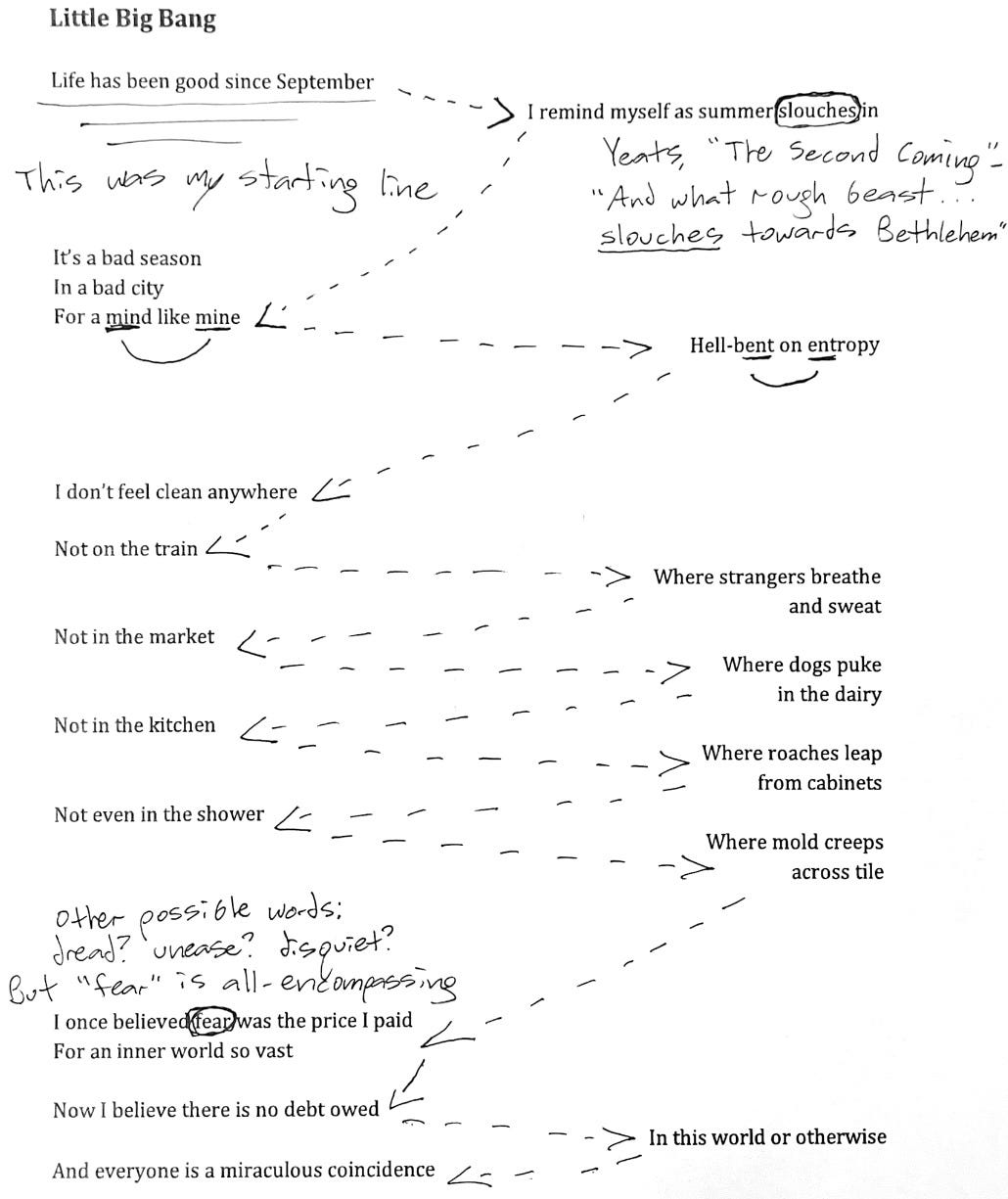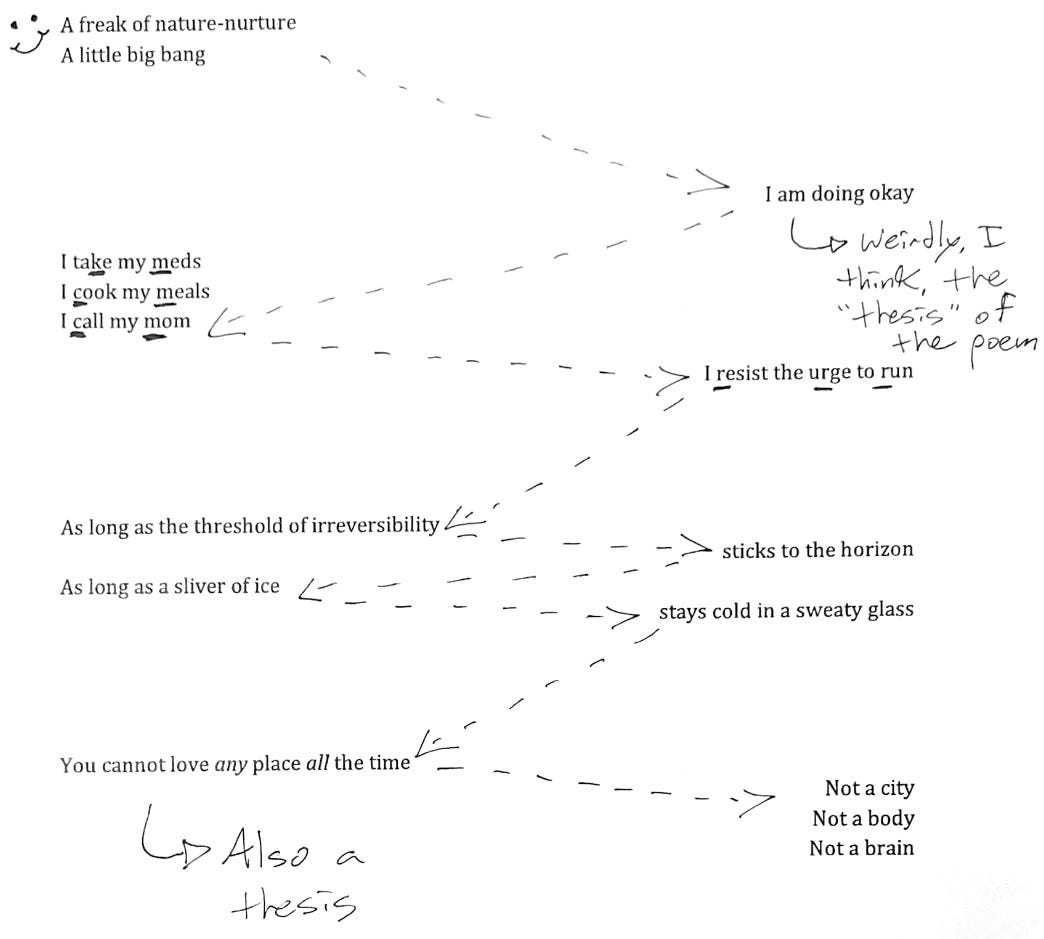Behind the Monster: "Little Big Bang"
A Poem Annotation & Analysis by the Author
Dear Reader,
There’s a stereotype that creative writers and STEM subjects don’t mix, but some of my favorite poets found inspiration in science. Take June Jordan’s “Poem Number Two on Bell’s Theorem,” or Walt Whitman’s “When I Heard the Learn’d Astronomer”.1 Unfortunately, I do fit into that unfair stereotype. (My college offered a class called “Physics for Poets” that I never took because even that sounded like too much science for me.) But I wasn’t going to let this shortcoming stop me from sneaking some science into my most recently shared poem.2
I wrote “Little Big Bang” last summer—a gross, sweaty, sticky summer spent in an apartment infested with roaches and bedbugs. (It was an absolute pit, but to its credit it did inspire a poem or two.) Now I live in a clean home that I actually like, but summer in New York is hard no matter what: unbearably hot subway platforms, literal rat races in the streets, and the ever-present smell of urine baked into sidewalks. Thankfully, I escaped to Colorado right as the weather was starting to get unbearable, so I can discuss this poem from a comfortable distance.
Even if you already read “Little Big Bang,” this might be your first time seeing it in its proper format, which Substack did not like. The format of the poem was one of the first things to solidify itself. I knew I wanted the reader’s eye to constantly dart back and forth across the page. This would mimic the speaker’s anxiety: the feeling of bouncing off the walls in a claustrophobic space.3 When I drew dotted arrows to track where the eye travels, I realized that the arrows get more cramped (therefore, the eye moves faster) as the speaker gets more uncomfortable—specifically when they list the places where they don’t feel clean. That wasn’t intentional, but I love the effect. It’s as if you can see where the reader is taking rapid, shallow breaths rather than slow, deep ones.
entropy, n. figurative. A state of or tendency towards disorder; an irreversible dissipation of energy resulting in stagnation or inactivity.4
Ironically, the Big Bang isn’t the scientific concept that most interests me in this poem—it’s entropy. “As long as the threshold of irreversibility / sticks to the horizon / As long as a sliver of ice / stays cold in a sweaty glass”. The threshold of irreversibility is a common concept in environmental studies, especially as it relates to climate change. How far can we go before the situation becomes so disordered that it is unfixable? How long can an ice cube stay frozen in a warming glass? The speaker hints at these global questions, but they seem more interested in how these conditionals apply to them on a smaller scale. How can I stay sound of mind while my environment deteriorates? By reminding yourself that no place is perfect. That some level of entropy is inevitable.
That’s all from me! Hope everyone is beating the heat! I will be putting on a lot of sunscreen and hiding under a lot of trees.
Thanks for reading.
Shadily,
P.S. A song to go along with “Little Big Bang”:
If you like Loose Baggy Monsters, consider leaving a tip! All donations will go toward submission fees for contests and lit mags, helping Jane get her writing into the world.
and/or
I’ve been watching Breaking Bad with my roommates, so that Whitman poem has been on my mind.
Luckily, one of the brilliant writers in my weekly workshop also studied astrophysics, so she was there to get me back on track when my scientific understanding got a little too fanciful. Thanks, Andrea—this one’s for you! ;)
You could also read the poem one column at a time. The left column sort of makes sense. The right column . . . not so much.
Oxford English Dictionary, “entropy (n.), sense 2,” March 2025, https://doi.org/10.1093/OED/3662766686.









